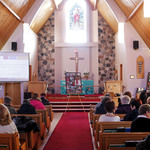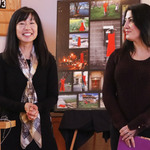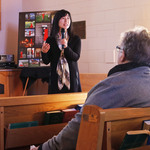“Women have the capacity to lead us to a more peaceful world with compassion, affection and kindness.” Dalai Lama
The Anglican Church Women (ACW) of Immanuel, Wetaskiwin welcomed more than 50 people, on February 9, to a day of learning and sharing about ways to build compassion in supporting women-at-risk.
Representatives of the Edmonton Mennonite Centre for Newcomers (EMCN), the Red Dress Photography Project and Wetaskiwin and District Victim Services made inspiring and informative presentations at “Women in Peril: Building Compassion.”
For 100 years, the Immanuel ACW has helped address women’s issues locally and around the world by reaching out to sisters in their local community, across Canada and internationally in Afghanistan and Burundi.
Immanuel ACW President Betty Anne Greenwall said members felt compelled to raise awareness for violence against women when they saw a display of red dresses honouring the lives and memory of missing and murdered Indigenous women at the diocesan annual meeting at All Saints’ Cathedral.
Eun-Jin Kim, an immigrant from Korea in 2000, and Arzoo Sabour, an immigrant from Iran in 2002, came to Canada as international students. Together the two women have more than 18 years of experience working at the Edmonton Mennonite Centre for Newcomers (EMCN), where they help people, many of whom are seeking refuge from war-torn countries, face the challenges of a new home, language and culture. In 2018, the center assisted up to 17,000 clients through programs like the Immigrant Women’s Integration Network (I-WIN) to help women build confidence and overcome isolation by improving their English language and employment skills; navigating transportation, medical and education systems; and joining supportive community networks. EMCN also offers a program for men focused on healthy relationships.
Established in 1981 to assist Vietnamese Boat People, EMCN has grown to include 250 employees who are trained in cultural sensitivity, speak a total of more than 50 languages and work in five Edmonton locations. Staff and volunteers often accompany clients on appointments to help interpret language and terminology. In recent years the centre, which receives much of its funding from Canadian and Alberta governments, has been gradually expanding its demographic reach beyond Edmonton to assist newcomers in rural Alberta communities through online programs. According to the 2016 Statistics Canada Census, about 1,310 immigrants, approximately 11 per cent of the city’s 12,486 residents, call Wetaskiwin home.
As women walked across Immanuel’s frozen churchyard on Saturday morning, their eyes were drawn to a single red dress hanging from tree branches above a sea of white snow. Later, in the warmth of the church, they held space in their hearts for missing and murdered Indigenous women and girls. As the women (including members of Immanuel’s Reconciliation Team wearing their ribbon skirts), reflected on an exhibit of red dress photographs, they shared feelings of grief, heartbreak, loneliness, sadness, coldness, pain, vulnerability and danger.
Four years ago, photographer Mufty Mathewson’s eyes focused on a newspaper image of a red dress in a forest with the caption: ‘Imagine if 1,181 of your daughters never returned home? Imagine no one cared.’ The picture was taken in honour of the memory of the 1,181 Missing and Murdered Indigenous Women and Girls cited in the RCMP report of 2014. Mathewson, then 81, felt compelled to act.
“So there I was sitting in my jammies in the living room reading the paper and thinking, ‘You know what? I do care,’” said the founder of the Red Dress Photography Project, speaking at the ladies’ day event with her team member, Jayme Blenkarn. She asked a young Indigenous woman, who was a member of her photography class, to help her take pictures of a dress blowing in the breeze along a railroad track in Stony Plain, and later invited members of her Images Alberta photography group to hang more second-hand dresses from the trees along her street. It was not long after that she discovered, and was further inspired by, Métis artist Jaime Black’s own REDress Photography Project, now a permanent installation in the Canadian Museum for Human Rights in Winnipeg.
Mathewson shares her exhibit, which has grown to include hundreds of red dresses photographed across Canada, at conferences, galleries and churches like Immanuel and All Saints’ Anglican Cathedral, which featured the collection during its annual Red Dress Memorial Service in October. There is an open invitation to join the project by taking your own red dress photo, and the installation can be booked for public showings through the project’s Facebook page.
Although domestic violence can affect people of any age, income level or ethnicity, women are at highest risk, said Petra Pfeiffer, executive director of Wetaskiwin and District Victim Services. She talked to those gathered for the ladies’ day about the signs of and ways to support victims of domestic violence. In 2018, her department, which includes three full-time staff and 12 volunteer advocates, made 2,040 contacts with victims, including children and senior citizens, in domestic violence cases.
Pfeiffer described the forms and cycles of partner abuse, and explained how isolation is often used to control victims in an abusive relationship.
“I usually know by what they’re telling me if I have a victim or abuser in front of me,” said Pfeiffer.
There are a few things you can do to help someone in an abusive relationship, said Pfeiffer.
“Finding a safe place to approach your friend or family member with sensitivity and without criticism may give them the courage to talk about their situation and may even give them strength to begin exploring their options. Do not wait for your friend to tell you about the situation,” she said. “Bring the subject up yourself and tell them you are concerned about their safety.” Family and friends must understand that leaving an abusive relationship is an extremely difficult, often dangerous process. Many fears prevent victims from trying to leave, including injury or death, lack of confidence in being able to provide for themselves and/or their children, diminished social status and the loss of common friends.
“There is also cultural or family pressure to stay in a relationship, regardless,” she said.
Anyone experiencing or concerned about domestic abuse can receive 24-hour support by calling the Family Violence Information Line (310-1818), or by visiting www.familyviolence.alberta.ca . Wetaskiwin does not have its own women’s shelter. The closest shelters are in Camrose and Maskwacis.
Ladies’ day participants were able to view the REdress Exhibit and discuss the presentations over lunch and fellowship in the church hall. Proceeds from the event will be shared among the EMCN and Wetaskiwin Victim Services.
“I think people want to become more aware about women’s issues and the ways we can engage with and support one another,” said Gaie Goin, a member of First United Church in Wetaskiwin.
“I’ve learned so much today – much more than I expected,” said local artist Colleen McGinnis, a member of the Evangelical Lutheran Church in Canada.
For a century, Immanuel ACW has been reaching out to women in need. In recent years it has supported projects and organizations such as the Neighbourhood Outreach Soup Kitchen and Victim Services in Wetaskiwin; the Hope Mission and Salvation Army in Edmonton; White Ribbon Campaign for the proper treatment of women and the Anglican Foundation across Canada; Women for Women in Afghanistan, and the Buyé Health Centre (maternity ward) and Mother’s Union (Dignity Kits) in Burundi.











































